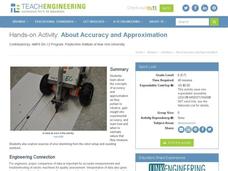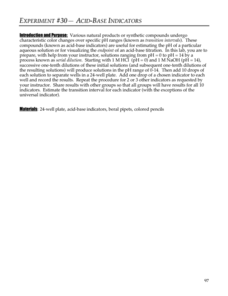EngageNY
The Difference Between Theoretical Probabilities and Estimated Probabilities
Flip a coin to determine whether the probability of heads is one-half. Pupils use simulated data to find the experimental probability of flipping a coin. Participants compare the long run relative frequency with the known theoretical...
EngageNY
Using Sample Data to Compare the Means of Two or More Populations II
The 23rd segment in a series of 25 presents random samples from two populations to determine whether there is a difference. Groups determine whether they believe there is a difference between the two populations and later use an...
Teach Engineering
About Accuracy and Approximation
How accurate are robots? Groups draw lines by moving robots backwards and forwards by one rotation of the wheels. Using the appropriate formula, they determine the percent error in the length of the lines in relation to the calculated...
EngageNY
Sampling Variability
Work it out — find the average time clients spend at a gym. Pupils use a table of random digits to collect a sample of times fitness buffs are working out. The scholars use their random sample to calculate an estimate of the mean of the...
EngageNY
Fraction Multiplication and the Products of Decimals
Class members come up with a hypothesis on the number of decimal digits in the product of two decimals. Learners work in groups to complete several decimal multiplication problems. The results help groups develop a conjecture on the...
EngageNY
More Practice with Box Plots
Don't just think outside of the box — read outside of it! The 15th instructional activity in a 22-part unit provides pupils more work with box plots. Learners read the box plots to estimate the five-number summary and interpret it within...
Concord Consortium
Fermi Weight
Wait, there is an estimate for how much that weighs. The resource contains three questions about weight. Using dimensional analysis and benchmarks, pupils determine a reasonable weight for trash, food, and a grain of salt.
Concord Consortium
Fermi Volume
It is about this big. An assessment provides three questions on the estimations of volume. Pupils determine the quantities needed and use dimensional analysis to arrive at estimations involving dollar bills, paint, and gasoline.
Concord Consortium
Fermi Time
It's all just a matter of time. The resource provides four Fermi questions in reference to time. The questions are open-ended and require classmates to make use of estimation and dimensional analysis.
NOAA
A Matter of Density
Larvae transportation on the New England seamounts is based on the density of the water. Scholars calculate density and graph salinity versus temperature to better understand the distribution of organisms in a water column....
Curated OER
Chemistry Day With Glitter Wands
First graders observe examples of the three states of matter and identify matter in each of the three states. They make glitter wands to remind them of the three states of matter: solid, liquid and gas. Pupils brainstorm and record...
Pingry School
Acid-Base Indicators
Acid-base indicators are an essential part of any chemistry classroom. Individuals explore the color-changing feature of the important indicators in a vibrant hands-on activity. Using serial dilution, learners create solutions ranging...
Curated OER
Measurement and Conversion of Units in a Recipe
In a cross-curricular measurement and literacy lesson, your class will identify and compare cooking measurement instruments. They read a recipe and sequence a set of similar instructions in which the steps have been mixed up....
Curated OER
Buying on Credit
Explore using credit in this financial responsibility and math lesson. Learn to identify the acronym of "PRT" as Principle x Rate x Time, then calculate interest based on this formula. Do some real-world problem solving and choose...
K12 Reader
5th Grade Master Spelling List
Here's a spelling program that includes 36 lists of 21 words and 20 suggestions for weekly activities. Each list includes common and proper nouns, sight words, academic vocabulary, and words built on a specific Greek roots.
Curated OER
Estimate Length
Without measuring, can estimators determine which string is the longest? The shortest? There are two sets of strings here for learners to evaluate, circling the shortest in the first set and the longest in the second. Next, they eyeball...
Other popular searches
- Estimating Measurement
- Estimating Sums
- Estimating Fractions
- Estimating Quotients
- Estimating Fractional Parts
- Estimating and Rounding
- Estimating Number Sums
- Estimating Concrete
- Estimating Square Roots
- Estimating Differences
- Estimating Numbers
- Estimating Purchase Prices















